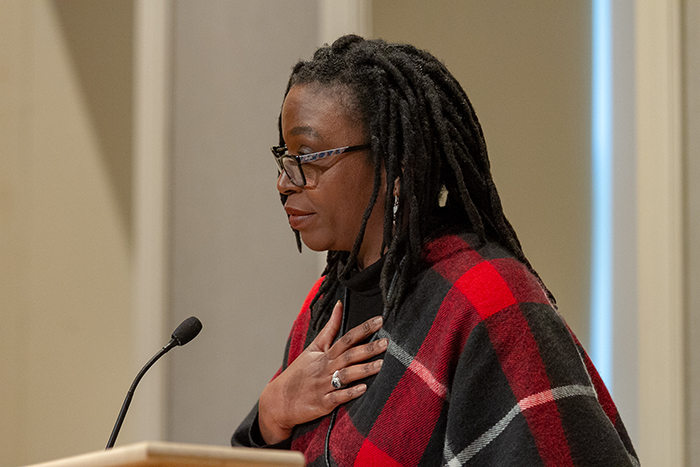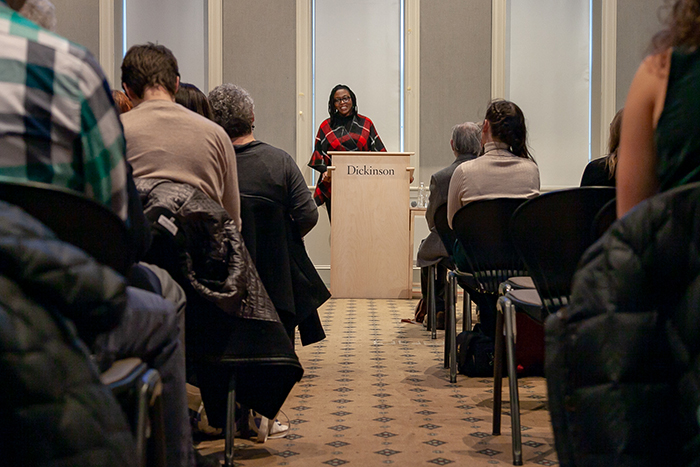Diversifying the Canon: The Ongoing Story of a Dickinson College English Major

Photo by Carl Socolow '77.
Cogan Alumni Fellow shares journey from English major to minister, scholar and practical theologist
by David Blosser '19
“Thank God for liberal-arts requirements,” said Rev. Dr. Annie Lockhart-Gilroy ’97, who recently extolled the virtues of Dickinson College's liberal-arts curriculum during a visit to campus through the English department’s Cogan Alumni Fellowship. Her visit included a lecture (view the archived livestream), reception and discussion on her research and work in womanist practical theology.
As a Virgin Islander from the town of Christiansted, Lockhart-Gilroy was shaped by the strength and resilience of her community. “My identity was formed in the context of people demanding to be seen and heard,” she proclaimed, pointing to her nation’s ongoing struggle for the full benefits of U.S. citizenship. So it comes as no surprise that Lockhart-Gilroy’s current work centers around methodologies that amplify marginalized voices.
Within the Limestone Walls
At Dickinson, Lockhart-Gilroy took an Introduction to Women’s Studies course and was disappointed by the experience. “The course was incomplete,” she noted, adding that “none of the major works read in the class centered the voices of black women.” While there may have been an article or two, it was clear that these marginalized voices were not a part of the established canon and were instead pushed to the periphery.
So Lockhart-Gilroy searched Dickinson’s library for books that centered on the voices of women of color. In the stacks of the upper level, she discovered Alice Walker’s In Search of Our Mother’s Gardens, from which she learned the term “womanist,” an area of study that explores the lives of black women. For her final project in the course, Lockhart-Gilroy created a syllabus that offered a more complete and diverse picture of women’s struggles and victories.
Lockhart-Gilroy’s passion for social justice was kindled during her senior year in an Introduction to American Studies course, which she took to fulfill a graduation requirement. She read The Sixties Papers, a collection of essays, letters and articles written by individuals demanding justice for marginalized people in the context of the 1960s American protest movements. “The class nurtured the rebellious spirit within me and armed it with theory and history. And that rebellious spirit remains part of my ministerial identity today,” she said.

Photo by Carl Socolow '77.
The Makings of a Minister
After graduating from Dickinson, Lockhart-Gilroy spent a few years teaching high school, further attempting to diversify the school curriculum. But when she discovered that teaching was not her calling, she decided to attend seminary. “Now to anyone who knew me in college this would make little sense,” she said. “While I went to church on occasion, I cursed like a sailor—not the makings of a minister.” Furthermore, she took only one course in religion at Dickinson.
The church ignited within Lockhart-Gilroy two things: her focus on youth ministry and her passion for social justice—not as secondary but rather primary to the gospel. “At the church, I found a community that helped me find my voice,” she said. “In sometimes heated discussions, I challenged, questioned, and I was sometimes told that I was wrong. But I was never told to be silent.” She learned that faith is lived out and that participating in the reign of God means working for what is just and right.
During seminary, Lockhart-Gilroy discovered that her vocational identity as a minister and an educator could go hand-in-hand. Following the advice of her mentor, Lockhart-Gilroy pursued a Ph.D. in Christian education and today teaches at Phillips Theological Seminary in Oklahoma. Her writings include womanist approaches to working with black girls, emancipatory pedagogy, faith and developmental theories, and ministry to, with and for youth and young adults.
As a minister, educator and scholar, Lockhart-Gilroy encourages students to “claim your education because you are the one sacrificing your time, your money and your energy. Make sure that this education works for you—demand it. If there is an assignment that you really want to do instead of the final, make a case for it. If there is an area of study within the class you want to dig around, make a case for it. Let’s talk. I’m not confined to a canon. In fact, I’d rather blow it all up. So let’s talk. That’s my invitation to them and that's my invitation to you [at Dickinson].”
The Cogan Alumni Fellowship is sponsored by the English department. Each spring, the department invites alumni to share their life and work experiences with current students and re-acquaint themselves with programs in the department and at the college. The fellowship is named in honor of Eleanor Cogan, who took more than 30 courses in Dickinson’s English department after her retirement from a career as a research chemist. The fellowship pays tribute to Cogan’s commitment to lifelong learning.
TAKE THE NEXT STEPS
Published March 7, 2019